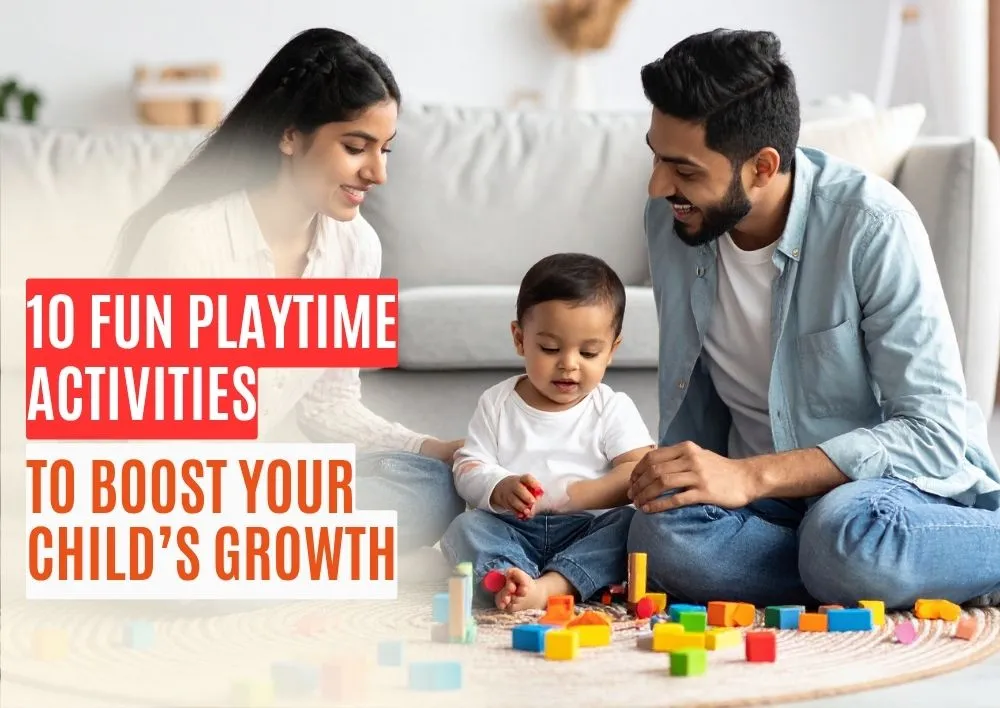10 Fun Playtime Activities to Boost Your Child’s Growth and Development – Recommended by Gurgaon Pediatric Experts
Summary
Playtime is more than just fun for babies; it is how they learn, grow, and explore the world around them. Every smile, giggle, and interaction helps in developing essential motor, social, and cognitive skills. Engaging in stimulating activities from the early months can boost brain development, strengthen muscles, and build emotional bonds between you and your baby.
Here are 10 simple and effective playtime activities -
1. Tummy Time for Strength and Coordination
Age group: Newborn and above
Tummy time is one of the most important activities for infants. Placing your baby on their tummy helps strengthen their neck, shoulder, and arm muscles, which are necessary for crawling later. It also improves balance and coordination, laying the foundation for important milestones like sitting and walking.
Dr. Gaurav Mandhan, the best Pediatrician in Gurgaon at Miracles Apollo Cradle, Gurgaon, says, “Tummy time is important for your baby’s physical development. It helps prevent flat spots on the head and encourages muscle control that supports future movement and posture.”
Tip: Start with a few minutes daily and increase the duration as your baby gets stronger. You can also place colorful toys or a mirror in front of them to make it fun and encourage reaching and movement.
2. Singing and Talking to Your Baby
Age group: 0–12 months
Your voice is your baby’s favorite sound. Talking, singing lullabies, or reciting nursery rhymes not only comforts your baby but also helps them recognize sounds and patterns, an important part of baby development activities. Listening to your voice supports language learning, emotional bonding, and brain growth from an early age.
Dr. Mandhan adds, “Talking and singing to your baby helps build early communication skills and strengthens the emotional bond between parent and child, key aspects of healthy baby development.”
Tip: Make eye contact and use different tones; babies love expressive voices!
3. Peek-a-Boo for Social and Emotional Skills
Age group: 4 months and above
Peek-a-boo never fails to make babies laugh! It helps them understand object permanence, the idea that things still exist even when they are out of sight. This simple game plays an important role in child development by enhancing memory, attention, and emotional understanding. It also strengthens your bond with your baby and builds a sense of trust and security.
Tip: Use a soft cloth or your hands to cover your face and say cheerful phrases to keep your baby engaged.
4. Mirror Play for Self-Awareness
Age group: 3 months and above
Babies are fascinated by mirrors. When they see their reflection, it sparks curiosity and helps develop visual tracking skills. As they grow, they start to understand that the reflection is their own face, boosting self-awareness.
Tip: Use a baby-safe mirror during playtime and talk about what they see.
5. Sensory Play for Brain Development
Age group: 6 months and above
Sensory play encourages babies to explore textures, sounds, and colors. You can create simple sensory activities using everyday items like soft fabrics, rattles, or water play. This improves fine motor skills and stimulates brain development.
Tip: Always supervise sensory play to ensure safety, especially if small objects are involved.
6. Reading Picture Books Together
Age group: 3 months and above
It is never too early to start reading! Picture books introduce babies to colors, shapes, and new sounds. Reading aloud helps them associate words with images, laying the foundation for language and memory skills.
Tip: Choose board books with large pictures and bright colors. Let your kid touch and explore the pages.
7. Rolling and Reaching Games
Age group: 6 months and above
Encourage your baby to roll over and reach for toys. This improves their hand-eye coordination and strengthens their muscles for crawling.
Tip: Place toys slightly out of reach to motivate movement, but ensure the area is soft and safe.
8. Music and Movement Fun
Age group: 6–12 months
Playing soft music and gently dancing or swaying with your baby can improve their balance, coordination, and listening skills. It also introduces them to rhythm and movement.
Tip: Use rattles, drums, or clapping to make the experience interactive and joyful.
9. Building Blocks for Problem Solving
Age group: 9 months and above
Stacking and knocking down soft blocks can teach your baby cause-and-effect relationships. It promotes fine motor skills, spatial awareness, and problem-solving abilities.
Tip: Choose lightweight, colorful, and soft-edged blocks that are easy for tiny hands to grip.
10. Outdoor Exploration
Age group: 6 months and above
Taking your baby outdoors exposes them to new sights, sounds, and textures. The natural environment stimulates their senses and encourages curiosity. Whether it is watching birds or feeling grass under their fingers, every moment supports cognitive and sensory development.
Tip: Always protect your baby from harsh sunlight and ensure a safe, clean environment.
Why Playtime Matters
Play is the foundation of early learning. It helps babies:
-
Develop strong muscles and motor skills
-
Improve social and communication abilities
-
Enhance creativity and problem-solving
-
Strengthen the emotional bond with parents
Each playful moment contributes to your child’s physical, emotional, and cognitive growth.
Conclusion:
Your baby doesn’t need expensive toys or gadgets, just your time, attention, and love. Engaging in simple playtime activities builds trust, joy, and confidence. Remember, every giggle and discovery is a step toward healthy growth and development.
So, set aside a few minutes every day to play, connect, and celebrate your baby’s milestones. These early interactions will shape not just their development but also the beautiful memories you will cherish forever. Want to know if your baby’s growth and milestones are on track? Consult an experienced pediatrician near you to help you track your baby’s growth, milestones, and overall health with expert guidance.
Frequently Asked Questions
Play improves motor skills, creativity, problem-solving, language, social interaction, emotional control, confidence, memory, focus, and overall brain development.
Playtime helps children learn, express emotions, build relationships, and develop physical, cognitive, and social skills naturally.
The five main areas are physical, cognitive, social, emotional, and language development.
Young children should have at least 1–2 hours of active play daily, including both structured and free play activities.














Was the information useful?
0 0